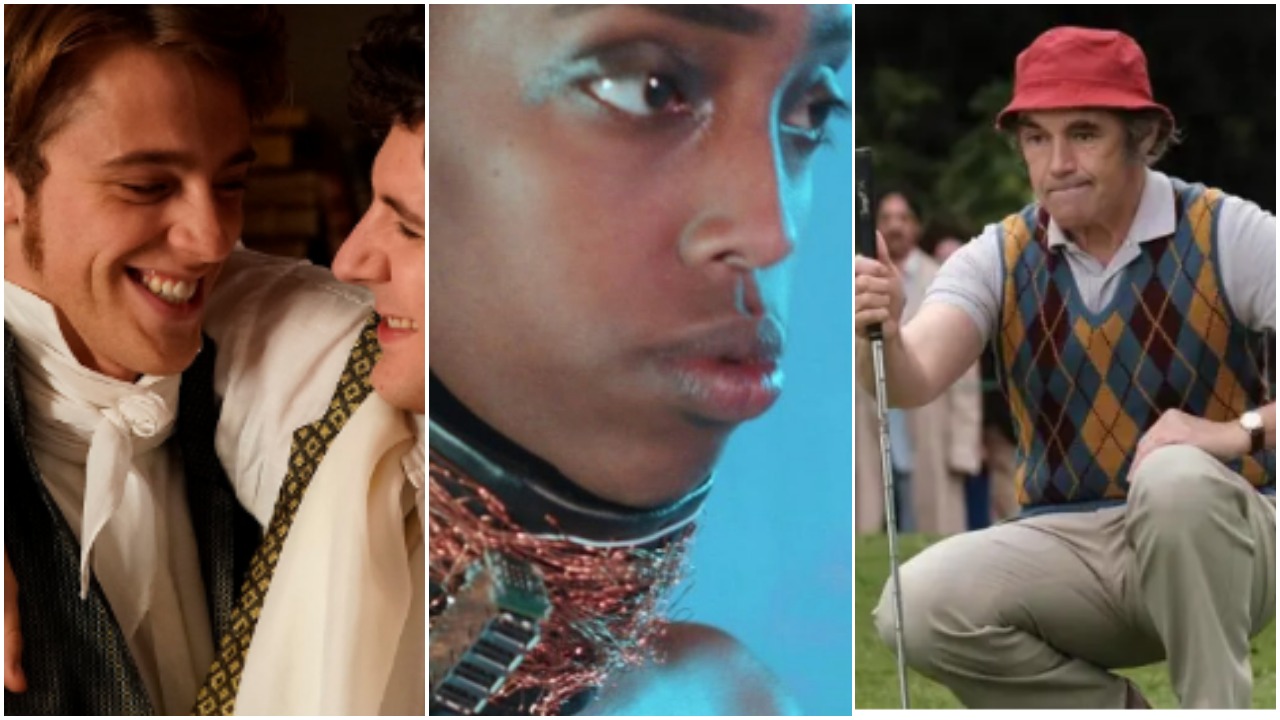A typical outing in the “dotty Brit pursues whimsical ambition” genre, The Phantom of the Open is more charming than it deserves to be. Mark Rylance is Maurice Flitcroft, the notorious barely amateur golfer who faked his way into the 1976 British Open and emerged with the worst score in the tournament’s history. Flitcroft was a Manchester shipyard lifer, a crane operator who, as he tells it, had a midlife epiphany that fixated him on golf, a sport for which he immediately and persistently displayed no real facility. His exploits earned him the enmity of the tourney’s directors, the often condescending fascination of the tabloids, and long-standing admiration of proud mediocrities worldwide.
The good news for people who hate movies that demand that they “feel good” is that Flitcroft never became a great golfer, so the film can’t build to any predictable triumph. The story doesn’t soar, it, well, flits, and lacking drama, the film manufactures it: Rhys Ifans all but twists his mustache as the villainous golf official who Maurice outwits, while Jake Davies occupies a bland subplot as Flitcroft’s stepson Mike, who frets that Maurice’s antics will doom the young man’s management ambitions at the shipyard. Do both men learn to accept Flitcroft and, implicitly, his chipper view of the world? Aha, you’ve seen a movie before! Phantom jolts its flatlined plot with bits of colorful characterization: Sally Hawkins does incredible heavy lifting in the thankless role of “supportive wife,” and without a basis in fact, no scriptwriter could ever have gotten away with the two twin sons who disco dance competitively.
Rylance is, as expected, eminently agreeable as the bucket-hatted quixotic, fending off snobs and utterly convinced that his persistence will transform itself into talent. But his single-mindedness eventually raises the question: Is this chap more than a little dim? The real Flitcroft, from what I gather, was more stubborn, possibly more ornery, and definitely more cheeky—a huckster rather than a naif. Rather than celebrating Maurice’s self-promotion instincts, The Phantom of the Open is more wide-eyed. It wants us to believe in ourselves and follow that dream, Elvis-like, wherever that dream might lead. It’s dishonest, not in the way that Flitcroft was, but in the way only movies can be.
Despite its attention to the cramped repetition of working class life, The Phantom of the Open is also something of a hoax about class. In typical movie fashion, it suggests that what keeps members of the working class stuck is a lack of imagination or gumption: You can always simply golf or disco dance your way out of your economic confines. Maggie Thatcher, glimpsed on telly for a sec here before Maurice flips dismissively to the next channel, would probably have agreed wholeheartedly.
Lucien Chardon has dreams to pursue as well, though ascendent 19th century capitalism proves a more formidable foe than the stagnant late 20th century variety Maurice Flitcroft dodges. Lucien, the striving nobody at the center of Lost Illusions, director Xavier Giannoli’s lively take on the Balzac novel, is a typesetter from the provinces who styles himself a poet. Once his successful seduction of a gentlewoman via versifying convinces him of his artistic gift, he sets off for Paris and is quickly smacked down by the snobbery of his mistress’s clique. He’s too ashamed to slump back home so, desperate, he settles into the most degraded profession of all: journalism.
That’s when the fun begins. The paper where Lucian apprentices himself has a boisterous frat-house atmosphere, complete with potent hash (thanks, imperialism!) and a pet monkey who choses which books get reviewed. (Even great novelists can be such crybabies about the critics.) Everything is available for a price, from a bosomy mistress to a rave review, and Giannoli is at his best conveying the energy, at once creative and destructive, of this societal upheaval. Royalists and liberals clash in the newspapers, in the theaters, and in the streets, as the nouveau riche and their poison-penned accomplices flaunt their lack of principles with revolutionary fervor. One entrepreneur trains crowds to hiss or cheer theater performances, depending on who pays him most; he eventually devises a machine that mimics applause on its own, automating his flunkies out of jobs.
As Lucien, Benjamin Voisin is pretty and impertinent enough to front a dystopian teen franchise, defiant and impassive even when a rival splashes an inkpot in his face. Even as he rises to influence, he’s about as scary as a leashed, snarling puppy. The more apparently secure his social position, the more out of his depth he clearly is. While the bourgeois and bohemians celebrate the rise of their new ideology, Chardon remains a sentimentalist and a snob, clinging to the vestigial nobility of his mother’s name, de Rubempré, and his view of literature as incorruptible and pure.
Lost Illusions doesn’t pry too deeply into these contradictions—Giannoli’s got a 600-page book to plow through, after all. His direction is sure-handed and limber, immune to period-piece stiffness, though the decision to use third-person narration renders the action not just novelistic but also fatalistic. Lucien’s downfall, the result of pride and debt and betrayal, is too prolonged and inevitable to rouse much sympathy. Also, he’s kind of a dick, and maybe his poems just suck? Anyway, what you’ll remember afterward is not Lucien’s tragic arc, but background details like Gerard Depardieu stomping around as a bullish grocer turned publisher with a yen for pineapples. There’s a reason the parts of the Manifesto where Marx describes capitalism are more vivid than his vision of the future.
Saul Williams is an ace word-worker who’s spent much of the 21st century searching for the ideal outlet for his talents, a slam poet who knew hip-hop was the ticket but could only occasionally sync his lyrics to the right beats. Six years ago, rapper turned darkwave rocker Justin Warfield supplied what Williams needed to make MartyrLoserKing an artistic breakthrough. In retrospect, anyway—in 2016 that album didn’t so much fly over my head at the time as skim over top it like a stone across a pond. In my defense, its densely knotted political imagery hinted at something beyond the scope of the recording itself.
That “something” turned out to be Neptune Frost, Williams’s astounding directorial debut, a collaboration with the Rwandan-born cinematographer (and Williams’s wife) Anisia Uzeyman (credited here as SWAN). And it sure is something, a vision of African techno-tribal hackers resisting their neocolonial masters, with a production design that communicates as directly (if not more so) as any plot. Special credit goes to Cedric Mizero’s brilliant costuming, which reworks traditional African garb, disconnected tech, and high fashion.
In Burundi, coltan, that excavated element that makes your phone smart, has become, as Williams’s lyrics put it, the new cotton. When one exploited miner is killed, his brother Matalusa (Kaya Free) is transported to a hacker compound where rebels conspire against the repressive Authority. A sexual assault sends the striking “intersex refugee” Neptune, (played, sequentially, by Elvis Ngabo, then Cheryl Isheja) to seek the same revolutionary shelter. Here's the hackers repurpose everything from spare computer systems to language: They greet each other with the fantastic phrase “unanimous gold mine.”
So, can the master’s tech dismantle the master’s hardware? Neptune Frost suggests that whatever resistance is truly on the horizon, neither blunt force nor a retreat into some romanticized pre-modern tradition will be sufficient. Brains, songs, and gadgets must all be rewired. Williams’s choruses have the chant-like quality of work songs, even when they’re quoting At the Drive-In, express defiance and joy in the face of globalism’s latest colonial permutation, and if you find the movie more intriguing than comprehensible, I’d suggest returning to the music. Listen to MartyrLoserKing with lyrics open in your browser, then come back to the movie, without worrying how literally you follow the narrative. If that sounds like too much work, well, nobody said the future would be easy.
The Phantom of the Open is playing in area theaters; Lost Illusions and Neptune Frost are playing at The Main.






